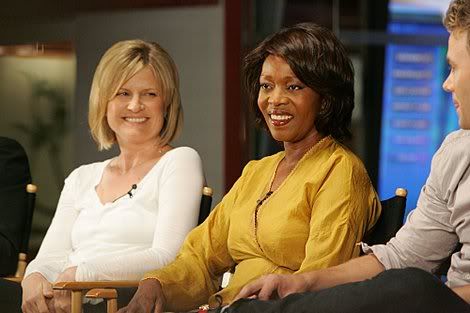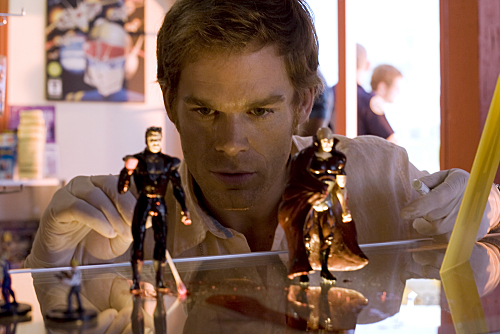 After studying film at Columbia University, writer-director Nicole Holofcener made her first feature, Walking and Talking, in 1996, and she has been going strong ever since, directing feature films such as Lovely & Amazing, Friends with Money and Please Give, as well as working in television, for acclaimed series such as Sex and the City, Six Feet Under, Bored to Death and Parks and Recreation. I had a chance to speak briefly with Holofcener on the occasion of Columbia’s panel on women filmmakers.
After studying film at Columbia University, writer-director Nicole Holofcener made her first feature, Walking and Talking, in 1996, and she has been going strong ever since, directing feature films such as Lovely & Amazing, Friends with Money and Please Give, as well as working in television, for acclaimed series such as Sex and the City, Six Feet Under, Bored to Death and Parks and Recreation. I had a chance to speak briefly with Holofcener on the occasion of Columbia’s panel on women filmmakers.
Ezra Stead: There is a striking realism and intimacy to your films, going back to the first one, Walking and Talking, and I know a lot of material is taken from your own life or that of your friends. Is your apparent muse, Catherine Keener, generally playing the Nicole Holofcener alter-ego, or is your own personality spread out more among all your characters?
Nicole Holofcener: I guess I could say she has been my muse, but in a couple of movies she has not played the “me” character. She certainly does play me well, and all the characters, I suppose, are a part of me, and even if that character she’s playing is based on someone else, there’s still pieces of me. She has been a muse, definitely.
ES: I read somewhere, in another interview with you, where you said your friends say, “Don’t say that around Nicole, it’ll be in a movie.”
NH: I know, just one friend in particular; she’s very nervous [laughs]. If somebody has shame, I suppose they don’t want to be revealed. Most people’s shame is not very interesting or theatrical, so don’t worry I’m not gonna write about it. Whatever you’re doing that you’re embarrassed about, I don’t care [laughs].
ES: So in general, your films are fairly autobiographical, or was Walking and Talking more that way?
NH: No, they all are. I mean, none of them are real, none of them come from things that really happened; I suppose there are moments that really happened and lines that really happened, but most of it is made up but, I would say, based on me and my experiences, and my friends.
ES: What future projects are you working on now, if you can tell us?
NH: I’d love to tell you. I’m so glad I have that, thank god, it’s so hard when there isn’t one. Yeah, I’m in pre-pre-production for a movie that I wrote that Fox Searchlight has been making, and I start shooting in August, I think. I hope.
ES: Untitled, so far?
NH: It is. Not fun. I’m not good at titling things. The only title I really like, that seems correct, is Friends with Money, and that’s what I wrote when I first started writing it, you know, this is gonna be about “friends with money,” it was easy. This one has Julia Louis-Dreyfus in it, and James Gandolfini, so I’m happy to publicize my next movie.
ES: I also read that you were involved at one point in directing the Seth Rogen / Joseph Gordon-Levitt film 50/50. Is that you’re still interested in pursuing – directing features written by other people?
NH: I’m still gonna direct 50/50 [laughs]. It’s something I am very interested in, and I’m sad that I didn’t get to direct it, but it was family stuff, and that’s okay, it turned out well. I liked the movie.
ES: But you are interested in directing someone else’s script?
NH: Yes, if I fall in love with it. I really want to, have to, fall in love with it. Yes, please send me things. Send me good things [laughs].
ES: You’ve directed a lot of TV as well. What are some of the differences in TV vs. feature film directing?
NH: There’s not much difference. The television shows that I’ve worked on have all been single camera. It feels like I’m working on a little film. It differs from show to show. A show like Enlightened, I feel like I’m working on a movie; a show like Parks and Recreation, I’m at a party. I mean, it’s different. I guess, to some extent, working on a television show is easier because it’s not my problem, in the end – I didn’t write it, I didn’t create it – and for the same reason, it makes me more anxious because I have someone else that I wanna please, besides myself, and I really only work on shows that I respect and am proud to have my name on, so I really do wanna please the writer, and the creator. Other than that, they’re pretty similar.
ES: So you think that, when and if you end up directing someone else’s script, it’ll be similar to that?
NH: I hope so, yeah. I hope that I have that relationship where I turn to the writer and say, “You happy with that? Is that how you saw it?” That’s a real collaboration.







